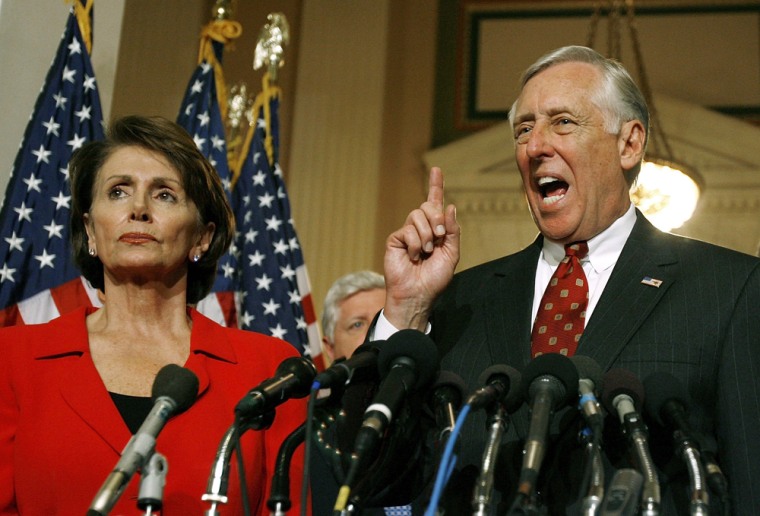Steny Hoyer helped raise more than $8 million for Democrats this election cycle. He traveled to 33 states and campaigned for and recruited candidates in 80 districts.
His broad appeal among fellow Democrats was evident Thursday when Hoyer captured the race for the No. 2 spot in the House on a 149-86 vote despite Speaking-in-waiting Nancy Pelosi’s backing of a rival lawmaker, Rep. Jack Murtha of Pennsylvania.
Hoyer, 67, has over the past quarter-century in the House become known for his fundraising, his work for fellow Democrats and for moderate political positions that have enabled him to get along with Republicans and liberal Democrats alike.
He was a chief recruiter for Democratic candidates from 1995 to 2000 after serving five years as chairman of the Democratic caucus, the party’s forth-ranked position. He will be majority leader in the new Congress in January.
In 2001, Hoyer lost to Pelosi in a close race for minority whip, the No. 2 position for Democrats when Republicans held power. But a year later he gained that post without opposition after Pelosi succeeded the retiring Rep. Dick Gephardt as party leader.
Hoyer has held that job, which involves coordinating party votes on key issues, ever since.
In politics since the 1960s
Hoyer, whose name Steny comes from his father’s Danish name “Steen,” graduated from the University of Maryland in 1963 and Georgetown University Law School in 1966. That same year, at 27, he won a seat in the Maryland Senate. In 1975 he became the youngest president of the state Senate.
In 1981 he won a seat in the House in a special election after the incumbent, Democratic Rep. Gladys Noon Spellman, fell into an irreversible coma. His Maryland district outside Washington originally had a large black population, but the district lines were later redrawn to incorporate more conservative rural areas.
Because many of his constituents work for the federal government, Hoyer long has championed federal worker rights and supported federal installations such as the Goddard Space Flight Center in Greenbelt, Md., which is in his district.
A mainstream Democrat on most issues, supporting health and education programs and opposing the Republican tax cuts, Hoyer also has been more pro-defense and pro-free trade than many of his Democratic colleagues.
Initially supported Iraq war
He voted for the North American Free Trade Agreement and trade relations with China; supported the Republicans’ unsuccessful attempt to approve a balanced budget amendment in 1995; and voted in 2002 to authorize military action in Iraq.
He has since joined other Democrats in charging that the Bush administration has mishandled the situation in Iraq and he has demanded a change in course.
Among his legislative achievements, he helped pass the Americans with Disabilities Act in 1990 and, working with Republicans, a major election overhaul law in 2001.
Hoyer’s office said it was his idea for congressional leaders and members to gather on the steps of the Capitol on the evening of Sept. 11, 2001, and sing “God Bless America.”
Hoyer, who is widowed, has three children.
